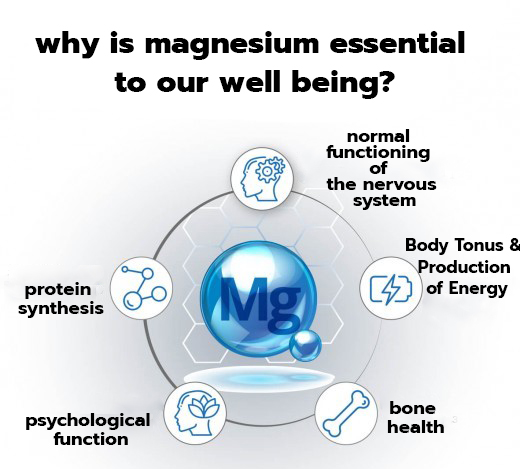Zoom on
magnesium
Magnesium is an essential mineral for the proper functioning of the body which participates in more than 300 enzymatic reactions. It acts on many functions of the body including fatigue or the functioning of the nervous and muscular systems.

Zoom sur le
magnesium
Magnesium is an essential mineral for the proper functioning of the body which participates in more than 300 enzymatic reactions. It acts on many functions of the body including fatigue or the functioning of the nervous and muscular systems.

Tiredness , nervousness and muscle fatigue are often the first signs of insufficient dietary magnesium intake .

*Bilayer technology:
Layer 1 : release of vitamin B6, and 150 mg of magnesium for immediate availability
Layer 2 : in contact with liquids, formation of a matrix around the remaining 150 mg of magnesium which will diffuse gradually and sustained over time. Gradual release:

(1) Tucker KL, Rich S, Rosenberg I, Jacques P, Dallal G, Wilson PW, Selhub J. Plasma vitamin B-12 concentrations relate to intake source in the Framingham Offspring study. Am J Clin Nutr. 2000 Feb;71
WHY MAG2 24H?
Marine magnesium 300mg-vitamin B6 2mg
THE RIGHT HIGH CONCENTRATION OF MAGNESIUM FOR NERVOUSNESS, TIREDNESS & MUSCLE FATIGUE:
→ That works quick (15 min)
→ That works 24 hours (bi-layer technology)
→ That works compliant (once a day)
→ That is affordable (cost effective)
→ That is of high pharma standards (Lab Cooper France)
EVERYTHING YOU NEED TO KNOW ABOUT MAGNÉSIUM

Our Advice To Stay Zen
Work, studies, family life or money problems can be sources of stress. Fortunately, there are solutions to avoid being overwhelmed by tensions. Here are some good habits

The Causes Of The Lack Of Magnesium
In France, more than 70% of the population lacks magnesium. A deficit which is not without consequences on health since this mineral intervenes in many functions

10 TIPS FOR SLEEPING WELL
Food, activity, environment… Several factors influence the quality of our sleep. Everyone can act on different parameters to help you fall asleep in the evening
FREQUENTLY ASKED Questions
How do I know if I'm lacking in magnesium?
Although a magnesium deficiency is complicated to detect, certain signs can warn: great anxiety, fatigue, nervousness, cramps, especially at night, and palpitations of the eyelids are the most frequent symptoms.
What are the causes of a magnesium deficiency?
There are many causes of magnesium deficiency
Here are some environmental and physiological factors favoring the lack of magnesium:
– le stress
– Sport (magnesium is involved in the production of energy by the body, sport increases magnesium losses via sweat in particular. ..)
– alcohol abuse
– age
– genes
What is magnesium used for?
The magnesium Magnesium is an essential mineral for the body. It is involved in 300 enzymatic reactions and contributes to the proper functioning of many physiological functions.
Magnesium contributes:
-Reduce fatigue
– Has a normal functioning of the nervous system
– Has a normal functioning of the muscular system
-Has normal psychological function
-Maintaining normal bones
-To maintain normal teeth
-A une fonction psychologique normale
-Au maintien d’une ossature normale
-Au maintien d’une dentition normale
What are the signs of magnesium deficiency?
Lack of magnesium can disrupt many important physiological functions and trigger fatigue, stress and muscle disorders. One of the main symptoms of lack of magnesium is fatigue. Magnesium has a very important role in the production of the energy necessary for the proper functioning of the body. Stress is also an indicator of lack of magnesium. Indeed, magnesium promotes nerve transmission and regulates the hormones released in stressful situations. A sufficient intake of magnesium therefore limits the negative effects of stress on the body. Other signs such as the appearance of cramps and muscle contractures can be linked to a magnesium deficiency. Finally, one of the frequent symptoms of a lack of magnesium is the eyelid that “jumps” or “trembles”. This is what scientists call eyelid fasciculation. If they are frequent, magnesium supplementation can help you get rid of them.
Where is magnesium stored in my body?
A healthy adult human body contains about 24g of magnesium, stored almost entirely inside the various cells of the body. More than half of the body’s magnesium is stored in the bones, a quarter in the soft tissues such as the brain or the heart and the remaining amount is stored in the muscles. Only 1% of magnesium is located in extracellular fluids, including plasma.
What are the magnesium requirements for a woman and for a man?
The recommended intake is the same for a woman, a man or a child, it is 6 mg per kilo of body weight and per day. For instance : 180 mg per day for a 30 kg child. 390 mg per day for a 65 kg woman. 480 mg per day for an 80 kg man. Pregnant women, athletes and adolescents have higher intake requirements, the dose of magnesium can be increased.

